China’s North Korea Conundrum: How to Balance a Three Legged Stool
China’s North Korea Conundrum: How to Balance a Three Legged Stool
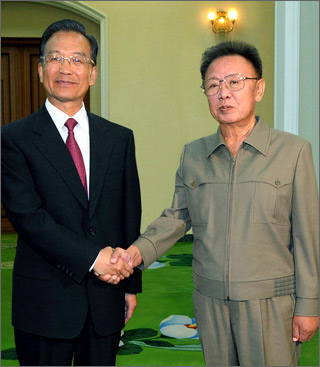
NEWPORT: The 60th anniversary of diplomatic relations between China and North Korea earlier this month provided the occasion for a high-level Chinese visit. But Chinese Prime Minister Wen Jiabao’s visit also underscored China’s daunting tasks in balancing its regional and global interests dealing with its embattled, nuclear armed neighbor.
Though nominally marking the anniversary, Wen and other senior Chinese officials sought principally to reshape the future contours of bilateral relations. Beijing has concluded that it must provide a continued lifeline to Pyongyang, in the hopes of stabilizing the regime and slowly incubating internal change in the North, without triggering fears of potential Chinese domination. At the same time, China is seeking to disentangle itself from its long-standing, if largely dormant, security obligations to North Korea, with future ties defined as “friendly cooperative relations,” not an alliance. Finally, Beijing is attempting to induce Pyongyang’s return to nuclear diplomacy, without conferring legitimacy or permanence to the North’s claimed status as a nuclear weapons state outside the Non-Proliferation Treaty. Beijing also fully recognizes that its ability to cooperate with the United States in inhibiting Pyongyang’s nuclear ambitions will be pivotal in shaping future US-China relations and East Asian security as a whole.
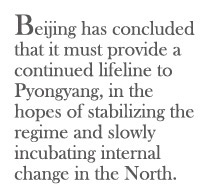
As China has become increasingly enmeshed in global politics, economics, and security, its historic ties with the North have become ever more tenuous. Beijing, however, retains few illusions about its ability to dictate to Pyongyang. Despite, or perhaps because of, the strategic stakes in Northeast Asia, China’s policies toward the North seem tactical, incremental, and cautious, though an evolutionary strategic logic underlies much of its behavior. Notwithstanding the North’s increasing economic, energy, and food dependence on China, Beijing does not possess matching influence over North Korean decision making, and Pyongyang has repeatedly defied China’s expressed policy preferences – a case of the weak trumping the capacities of the strong. Leaders in Pyongyang have thus concluded that its nascent nuclear weapons capabilities and China’s continued fears of a major peninsular crisis inhibit the Chinese from fully jettisoning ties with Pyongyang, despite the fact that Pyongyang has regularly stymied China’s expectations about North Korea curtailing its nuclear programs. Notwithstanding Kim Jong Il’s recent expression of interest in bilateral talks with Washington and signs of tactical flexibility toward Seoul and Tokyo, he has not wavered from the exceptionalist mythology that has defined North Korea throughout its history.
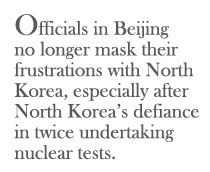
Officials in Beijing no longer mask their frustrations with North Korea, especially after North Korea’s defiance in twice undertaking nuclear tests. The second nuclear detonation occurred less than 100 kilometers from the Chinese border and Pyongyang has disavowed all previously negotiated restraints on its nuclear development. Confronted by the North’s egregious misconduct, Beijing has pursued a two-sided approach. It participated fully in U.N. Security Council deliberations, endorsed the sanctions imposed by the Security Council in mid-June, and is collaborating with the United States and others to implement the sanctions regime. At the same time, China’s leaders have permitted harsh criticisms of North Korea in authoritative journals and newspapers that would have been unimaginable in the past. Chinese analysts now write contemptuously of the North and of how its actions have threatened Chinese interests. Some senior officials have also voiced severe, if private, criticisms. By characterizing North Korea as an increasing liability to China, Beijing has sought to deny Pyongyang any political or strategic advantage from its nuclear actions. Though this harsh assessment does not dominate official policy, there seems no doubt of its increased legitimacy and prominence in Chinese internal debate.
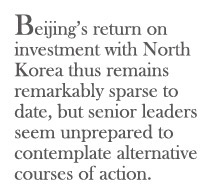
The second track of Beijing’s response has focused on keeping North Korea afloat. This latter strategy, much in evidence during Wen’s visit to the North, seeks to retain normal interstate relations and avoid excessive punishment or isolation of Pyongyang. During Wen’s visit, China and North Korea signed various documents on economic and technological collaboration, with Beijing offering the prospect of longer-term investment and infrastructure development. Despite some explicit aid commitments, these accords are more “in principle” agreements, rather than definitive long-term financial obligations. Comparable offers of economic assistance on previous high level visits failed to produce significant results, and it seems doubtful that China is prepared to place major resources at risk in the absence of unambiguous shifts in North Korean policy and behavior. A protocol on “the adjustment of treaties between the governments of the DPRK and China” was also signed. There are as yet no details on this protocol, and it remains unclear whether it has direct implications for limiting or removing the security component of the 1961 treaty, a sentiment much in evidence in China’s recent internal debate over North Korea strategy.
In Wen’s farewell meeting with Kim Jong Il, the North Korean leader also offered a conditional, hedged statement of renewed interest in diplomatic discussions over nuclear weapons. Kim declared the North’s “readiness to hold multilateral talks, depending on the outcome of the DPRK-U.S. talks,” with the latter premised on the cessation of “hostile relations” between Washington and Pyongyang. Upon his return to Beijing, Wen argued that “now there is an opportunity before us” to renew multilateral nuclear diplomacy with the North, but that “the opportunity, if not seized, may disappear.” Beneath a veneer of cautious optimism, the Prime Minister conceded that renewed diplomacy with Pyongyang could prove fleeting and unproductive. Indeed, a DPRK Foreign Ministry spokesperson only a week earlier had declared North Korea’s denuclearization “unthinkable.”
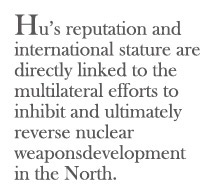
But Hu Jintao and other senior Chinese leaders are intent on pursuing renewed nuclear diplomacy. Hu’s reputation and international stature are directly linked to the multilateral efforts to inhibit and ultimately reverse nuclear weapons development in the North, with China serving as host, convener, and facilitator of the Six Party Talks. An explicit admission of the failure of multilateral talks would be a severe blow to Hu’s prestige, and also a major challenge to China’s regional strategies.
Are the North’s nuclear actions still reversible or at least containable? This remains the animating belief underlying recent Chinese actions. Beijing is not endeavoring to push Pyongyang into a corner, but it is also unprepared to legitimate North Korea’s claims to status as a nuclear-armed state. Kim’s latest statement has sustained China’s attempt to resurrect nuclear diplomacy with the North, with China again urging the United States to undertake direct talks with Pyongyang. But the Obama Administration has rejected any renewed compensation to North Korea in view of Pyongyang’s decision to walk away from all previously negotiated restraints on its nuclear weapons activities and its declared intention to expand its weapons programs. Secretary of State Hillary Clinton has also reiterated that “current sanctions will not be relaxed until Pyongyang takes verifiable, irreversible steps toward complete denuclearization,” and that “sanctions-free relations with a nuclear-armed North Korea” are impossible.
Beijing’s return on investment with North Korea thus remains remarkably sparse to date, but senior leaders seem unprepared to contemplate alternative courses of action, at least for the present. China may also be looking beyond the Kim Jong Il era, on the assumption that the North’s future leadership will conclude that true security and survivability cannot be based on nuclear weapons. But with Pyongyang still determined to control its own strategic fate, Beijing’s effort to sustain a balanced North Korea strategy will almost certainly be tested much sooner.
Jonathan D. Pollack is Professor of Asian and Pacific Studies at the U.S. Naval War College. These views are his own, and should not be attributed to the U.S. Government, the Department of Defense, or the Naval War College.